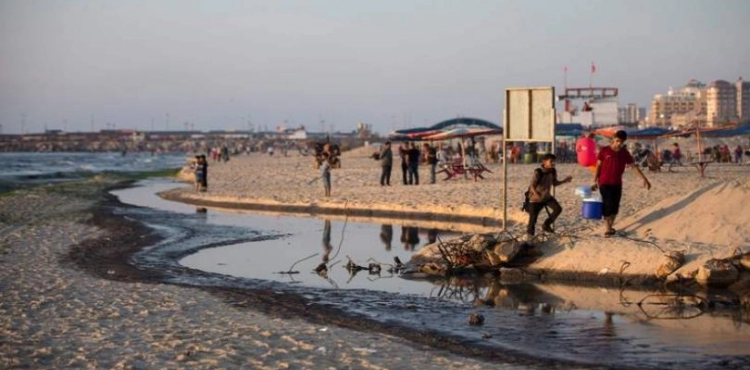Gaza _ Palestine News Network
The water Department of the Sahel municipalities in the Gaza Strip warned of the interruption of drinking water for long periods, with the supply of diesel required to operate water and sanitation facilities.
The water department said in a statement on Sunday that over the past years, the negative effects of power outages, which may at times amount to a disaster, have been exacerbated by the failure to operate a single power plant in Gaza on a regular and adequate basis.
It noted that sufficient quantities of fuel were not available for the operation of standby generators in water and sanitation facilities, "which are now operating outside the safe and technically recommended range".
She reported that the worsening of the electricity crisis in the Gaza Strip and the entry into force of the quantities of diesel required for the operation of water and sanitation facilities, especially after the end of the grant allocated by the organization "OCHA ", had begun to have a significant negative impact on the provision of the required minimum level of water and sanitation services.
"This will lead to major crises and repercussions that directly affect the lives of citizens, as well as the decline of the water and municipal interests in the collection, pumping and treatment of wastewater," she added.
"The probability of a rash of sewage water, especially in geographically low-lying areas, is noted."
She stressed that the various facilities of the water and sanitation sector depended mainly on the electrical power to manage them, and that any disruption of the electricity system directly affected the level of services provided.
In order to maintain the acceptable limit for water services, the requirements for diesel fuel were estimated at 250,000 litres per month, in addition to 150,000 litres per month for sewage pumping and treatment services, a total of 400,000 litres per month.
It revealed that most of the other wells operate about eight hours of electricity and six hours of generators, "which has lost the water production system for the most part about 40 percent of the natural capacity."
She reported that the daily rate of water production during the current period of the year had dropped from 230,000 cubic metres per day to 170,000 cubic metres per day, due to the electricity and fuel crisis, and a significant reduction of 70 per cent of the production capacity of desalination plants had been recorded.
She cautioned against an increase in the amount of sewage flowing into the sea and untreated due to intermittent operational realities and power outages.
"The irregular treatment of wastewater has led to an increase in the organic load of treated and produced water from the ecologically and healthier limits to about 150 to 200 BOD mg per litre (BOD amount of oxygen dissolved in water, expressed as parts per million or milligrams per liter of water) ".
The sewage collection and pumping system of various neighbourhoods and cities had deteriorated dramatically, she said, noting that many population places were at risk of flooding and environmental and health contamination.
She stressed that the persistence of the power outage crisis threatens a real crisis that will lead to a significant decline in the quality of basic services provided to citizens, and that the continuation of this crisis will reduce the work of many water wells, pumping stations and desalination plants to a minimum.
She stated that many areas in the Gaza Strip were highly susceptible to being coerced, if sanitation services ceased from those areas, threatening the lives of thousands of people.
It called for concerted efforts by national institutions to find a speedy and lasting solution to this renewed crisis, as it causes environmental and health disasters if they worsen.
It also appealed to the coastal municipalities water Service, all international humanitarian and relief institutions and United Nations organizations to urgently intervene to provide adequate quantities of fuel to alleviate the electricity blackout in the Gaza Strip and to enable the interest and municipalities to continue to operate their facilities Vitality.
The Israeli blockade imposed on the Gaza Strip since 2006 has caused disastrous crises and repercussions for the residents of the strip.
The siege was further aggravated by the decision of Palestinian Authority President Mahmoud Abbas to impose further punitive measures against the Gaza Strip, forcing Hamas to relinquish power there.












